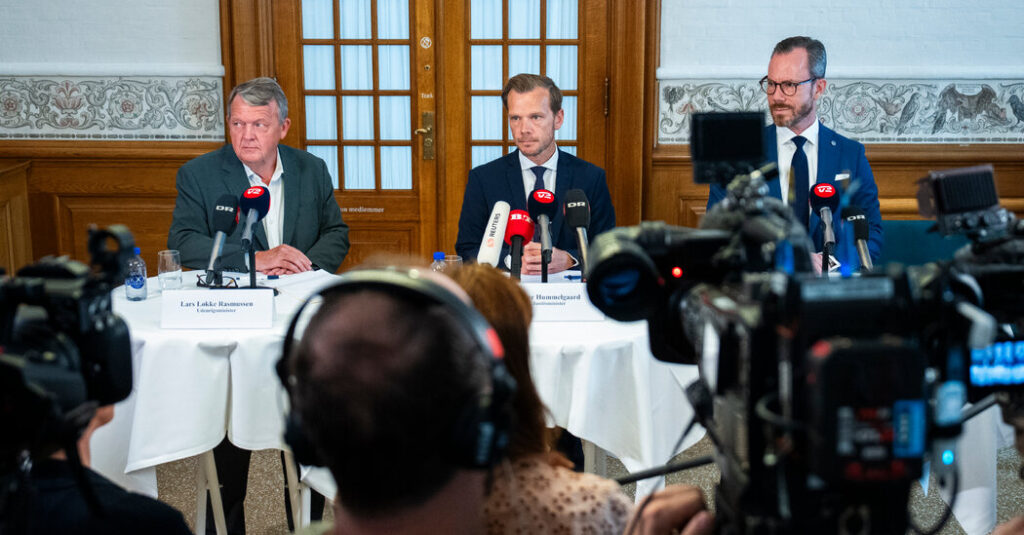Denmark’s government said on Friday that it would move to criminalize the public mistreatment of religious objects, setting aside free-speech concerns with what one minister called a “targeted intervention” after a spate of public Quran desecrations caused furors in many Muslim-majority countries.
Those found guilty of mistreating an object with major religious significance could be fined or sentenced to up to two years in prison, according to a draft of a bill published by the Danish Justice Ministry. Danish coalition officials said they could enact the policy as soon as the end of the year if it is approved by Parliament.
Both Denmark and neighboring Sweden have struggled to balance respect for free expression with the diplomatic fallout of the desecrations. Governments in many Muslim-majority countries have issued withering condemnations, and authorities in both countries have said that the risk of terrorist attacks has risen in recent months, posing a threat to national security.
After a small group of Danish nationalists filmed themselves burning what they said was a Quran late last month, hundreds of Iraqi protesters tried to storm Denmark’s embassy in Baghdad before security forces dispersed them. On Sunday, the Iranian authorities summoned Danish and Swedish diplomats to chastise them over another series of desecrations in both countries.
Foreign Minister Lars Lokke Rasmussen told reporters that there had been more than 170 demonstrations, including some with Quran burnings, in front of the embassies of Muslim-majority countries and elsewhere in Denmark over the past month. The protests, which are generally small, often denounce Islam and Muslim immigration.
“This has put Denmark in a difficult foreign-policy situation,” Jakob Ellemann-Jensen, the country’s deputy prime minister, said on Friday. “And the government cannot just sit and listen to that.”
Justice Minister Peter Hummelgaard characterized the proposal as a “targeted invention” against Quran burnings that “damage the security of Danes both abroad and at home.” Presenting the measure on Friday, Mr. Hummelgaard pledged that a “very broad framework” for freedom of expression would remain in Denmark.
He said the proposed law would not apply to clothing or satirical drawings, for example, and would not constrain criticism of religion. “I think there are more civilized ways to express your opinions than by burning things down,” he said.
Danish critics immediately slammed the bill as an assault on the country’s historically strong protections for free speech and as a capitulation to violence. The Liberal Alliance, which holds 14 of 179 seats in Parliament, said it was “a sad day for Danes and a good day for extremists.”
Jacob Kaarsbo, an analyst at Think Tank Europa in Copenhagen, called the bill “an effort to reach out to the Muslim mainstream” and tamp down tensions by showing Muslim-majority countries that Denmark was taking the problem seriously.
“It’s ultimately very few people that are behind this, but they’re having an outsized impact,” Mr. Kaarsbo said, referring to the Quran desecrations.
This is far from Denmark’s first brush with controversy surrounding the boundaries of free speech and Islam. In 2005, a Danish newspaper published several cartoons depicting the Prophet Muhammad that many Muslims considered blasphemous and that set off violent protests and attacks.
Far-right Scandinavian provocateurs have burned the Quran occasionally for years to signal their opposition to Muslim immigration into countries like Denmark. But tensions this year began to rise after Rasmus Paludan, a right-wing nationalist and dual citizen of Sweden and Denmark, set a copy of the Quran ablaze in January.
In late June, Salwan Momika, an Iraqi immigrant to Sweden, burned a Quran outside a mosque in Stockholm. A Muslim man was later granted a permit to burn a Torah and a Bible outside the Israeli Embassy in Stockholm but did not follow through. He later told reporters that his intention had been not to burn the scriptures but to underscore the abhorrent nature of such acts.
The governments of many Muslim countries have fiercely denounced Denmark and Sweden for allowing the burning of Qurans. Both governments have repeatedly condemned the desecrations but said they were constrained by free-speech laws.
Sweden, which hopes to join NATO, fears that the controversy could delay its membership. Turkey’s foreign minister said last month that Stockholm’s inability to “prevent provocations” had raised questions about Sweden’s credentials for membership.
In mid-July, hundreds of people stormed the Swedish Embassy in Baghdad and set parts of it on fire over the Swedish government’s decision to allow the desecrations. Iraq also expelled the Swedish ambassador and directed his Iraqi counterpart to withdraw from the Iraqi Embassy in Stockholm.
Last month, Prime Minister Ulf Kristersson of Sweden described the security situation there as the most serious since World War II. This month, Sweden’s domestic security agency raised its terrorism threat level to “high,” the second-most severe designation in a five-point scale.
Jasmina Nielsen contributed reporting from Copenhagen.


